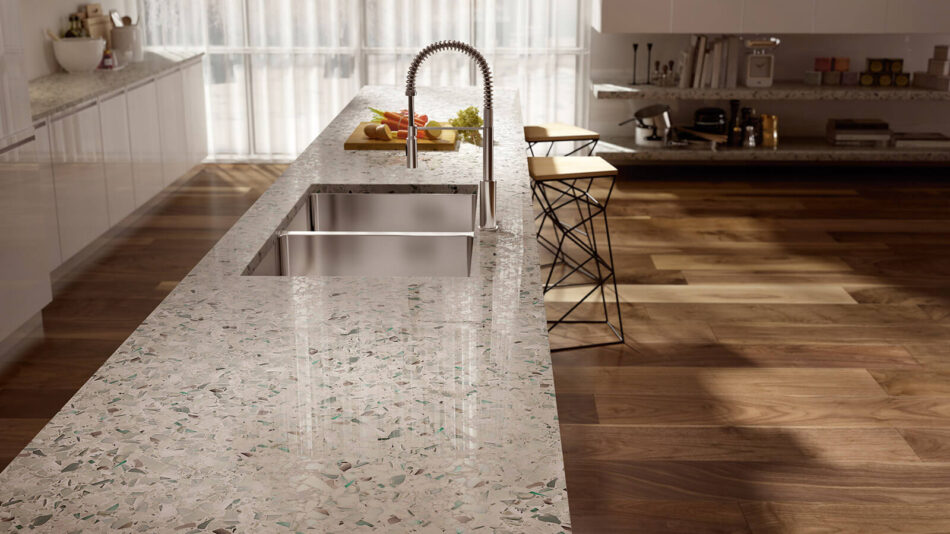Whether you’re remodeling or building a new kitchen, the countertops are the focal point. All of your other kitchen decisions hinge around picking your countertop. Therefore we realize how difficult it is to choose your countertops in such a vast material market.
However, dealing with quartz has several distinct advantages and disadvantages compared to natural stone options such as granite or marble.
Some are traditional, while others are more practical. That can’t be a straightforward response, can it? No, that would be too simple.
Pros of quartz countertops
- Duration
- Appearance
- Not porous
- Stain-resistant
- Low maintenance
- Versatility
Cons of quartz
- Price
- Appearance
- Sensitive to heat damage
- Installation is difficult
What is quartz?
Before we can grasp the benefits and drawbacks, we need to understand what quartz is and how quartz countertops are made.
Many people believe quartz is a manufactured substance. Quartz worktops are made by powdering genuine quartz and mixing it with various natural and artificial components like polymers, resins, and colors.
Quartz is bound together with resins and polymers to make it solid and durable, and pigments are added to give the worktop color.
Sometimes recycled glass or metal is used to liven up the design. Natural quartz accounts for around 90% of the final product, with additional minerals accounting for 10%.
Pros of quartz countertops:
If you’re thinking of getting quartz but need a little more convincing, here’s a detailed list of reasons why you should.
1. Duration:
Quartz is highly durable, which is one of the primary reasons people purchase it. Quartz is the material to use if you want something that won’t crack, scratch, or chip easily.
2. Appearance:
Another advantage of quartz is the wide range of sleek, clean, and contemporary designs available.
The manufacturers of Quartz countertops in Wisconsin can use pigments and other materials like recycled glass and metal flecks to produce practically any desired shape and color.
Contrary to natural stones, such as granite and quartz, you are not limited to the designs offered by Mother Nature.
3. Not porous:
Liquids can seep beneath the surface of porous materials, causing staining, discoloration, and irreversible damage.
Worse, germs and bacteria can seep into pores, doing cleaning and disinfecting them difficult. Because of this, natural stone countertops must be adequately sealed.
4. Stain-resistant:
Let’s take a closer look at some older kitchens with stone surfaces. White spots, discoloration, and discoloration are likely to appear in this instance, especially if the homeowner has neglected to reseal the surface every few years.
5. Low maintenance:
One of the most common reasons individuals purchase countertops is that they are low-maintenance.
Anything that mentions waterproofing granite countertops should be ignored. You’ll never have to worry about quartz being waterproof, and cleaning it is a breeze. Soap and water should be used to clean them.
6. Versatility:
In addition to using quartz for kitchen countertops, baths, fireplaces, bars, and other parts of the home, it is also an excellent choice for outdoor terraces. Because of its durability and wide range of colors and styles, it is a very elastic material.
Read Also: Seven amazing tips for buying rugs online
Cons of quartz:
So far, I’ve focused on the positive qualities of countertops, but before you call your contractor and order many knives, you should be aware of the drawbacks. Here are some of the reasons why quartz is a good investment.
1. Price:
Quartz has a price tag that includes durability, non-porosity, and the flexibility to create bespoke designs. Quartz costs between $50 and $150 per square foot, including installation, although the final cost is determined by the quartz’s quality, manufacturer, style, design, and edge type.
2. Appearance:
Granite or marble may be the finest choice if you want a totally unique look from natural stone.
Engineered quartz can imitate the look of natural stone thanks to modern technology, but it’s hard to equal the beautiful waves and veins of the real thing.
3. Sensitive to heat damage:
Quartz is a heat-resistant material. Resins and polymer fillers, on the other hand, are not. Exposing countertops to hot pots may cause the resins to melt, resulting in discoloration and long-term damage. Heat damage is evident by white patches and cloudiness. Some experts claim that quartz can survive temperatures of up to 300 degrees without being damaged, while others claim it can withstand temperatures of up to 150 degrees.
4. Installation is difficult:
Quartz installation is not a weekend project. According to the installers, the foundation must be physically stable and robust enough to sustain the quartz bulk.
Conclusion:
In my opinion, the benefits of quartz countertops outweigh the disadvantages. A wide range of trendy, modern, and natural designs is available, as well as stain-resistant and non-porous properties. There isn’t much about countertops that you don’t enjoy. I hope that this article has provided you with all of the information you need to make an informed decision on which quartz material to use in your kitchen.






